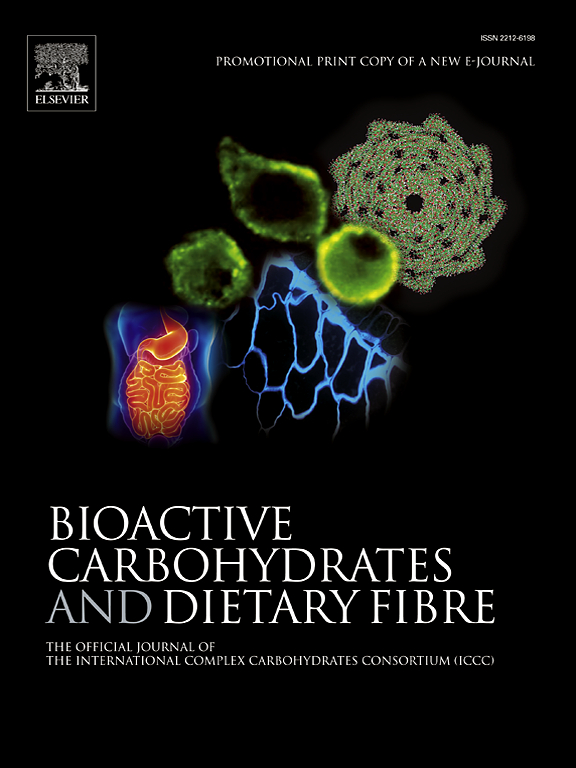Livaux® gold kiwifruit powder consumption at 600 mg per day for 28 days increases Faecalibacterium prausnitzii numbers and decreases bloating and hydrogenotrophic species numbers in healthy individuals, consistent with slow fermentation: A randomized controlled trial
IF 3.6
引用次数: 0
Abstract
Kiwifruit is renowned for its benefits to laxation. Livaux® is a gold kiwifruit powder retaining whole fruit benefits, including high-methoxy pectin content. Livaux was previously shown to provide laxation support and increased faecal F. prausnitzii. F. prausnitzii is known to use high-methoxy pectin as substrate.
We aimed to determine the changes to laxation and faecal F. prausnitzii numbers from 600 mg of Livaux. We used a randomized, double-blinded, placebo-controlled parallel-arm study with 85 participants conducted across four North American sites, comparing 28 days of 600 mg Livaux consumption vs cellulose placebo. The study was powered for the primary outcome Complete Spontaneous Bowel Movements (CSBM).
Participants visited at screening, baseline and endpoint. Anthropometric measures, hematology, clinical chemistry and hematology and fecal samples for microbiome assessment were collected at baseline and endpoint. Clinical outcomes (CSBM, Bristol Stool Form Score (BSFS), spontaneous bowel movements (SBM) and participant-assessed constipation symptoms and quality of life), food diaries and adverse events were recorded daily throughout the study. Analysis of the intent-to-treat population assessed differences from baseline to endpoint using ANOVA with post-hoc Tukey's T-test, an assessment of change from baseline to days 7, 14, 21 and 28 using repeated measures ANCOVA.
Livaux supplemented participants showed significantly increased fecal F. prausnitzii relative abundance, whilst placebo did not. Participants also showed significantly improved CSBM, SBM, BSFS and constipation symptom and quality of life scores over baseline.
Livaux supplementation improved laxation and increased F. prausnitzii at the low dose of 600 mg.
This study was registered at https://clinicaltrials.gov/study/NCT03462199.

一项随机对照试验:每天摄入600毫克Livaux®金猕猴桃粉,持续28天,会增加健康个体的prausnitzii粪杆菌数量,减少腹胀和氢营养物种数量,与缓慢发酵一致
猕猴桃以其通便功效而闻名。Livaux®是一种黄金猕猴桃粉,保留了整个水果的好处,包括高甲氧基果胶含量。Livaux先前被证明可以提供通便支持和增加粪F. prausnitzii。已知prausnitzii以高甲氧基果胶为底物。我们的目的是确定600毫克利沃克斯对通便和粪便中prausnitzi数量的变化。我们采用了一项随机、双盲、安慰剂对照的平行研究,在北美的四个地点进行了85名参与者,比较了28天600毫克Livaux和纤维素安慰剂的摄入量。该研究的主要结果是完全自发排便(CSBM)。参与者在筛查、基线和终点进行了访问。在基线和终点收集人体测量、血液学、临床化学、血液学和粪便样本,用于微生物组评估。在整个研究过程中,每天记录临床结果(CSBM、Bristol大便形式评分(BSFS)、自发排便(SBM)和参与者评估的便秘症状和生活质量)、食物日记和不良事件。使用方差分析和事后Tukey’st检验评估治疗意向人群从基线到终点的差异,使用重复测量ANCOVA评估从基线到第7、14、21和28天的变化。补充Livaux的参与者粪便中F. prausnitzii的相对丰度显著增加,而安慰剂则没有。与基线相比,参与者的CSBM、SBM、BSFS、便秘症状和生活质量评分也有显著改善。在低剂量600 mg时,补充Livaux可改善通便并增加prausnitzi。本研究注册于https://clinicaltrials.gov/study/NCT03462199。
本文章由计算机程序翻译,如有差异,请以英文原文为准。
求助全文
约1分钟内获得全文
求助全文
来源期刊

Bioactive Carbohydrates and Dietary Fibre
Agricultural and Biological Sciences-Food Science
CiteScore
6.00
自引率
0.00%
发文量
38
期刊介绍:
 求助内容:
求助内容: 应助结果提醒方式:
应助结果提醒方式:


